八年级英语2单元3课时
遵化市实验中学八年级英语下册 Module 2 Experiences Unit 3 Languag
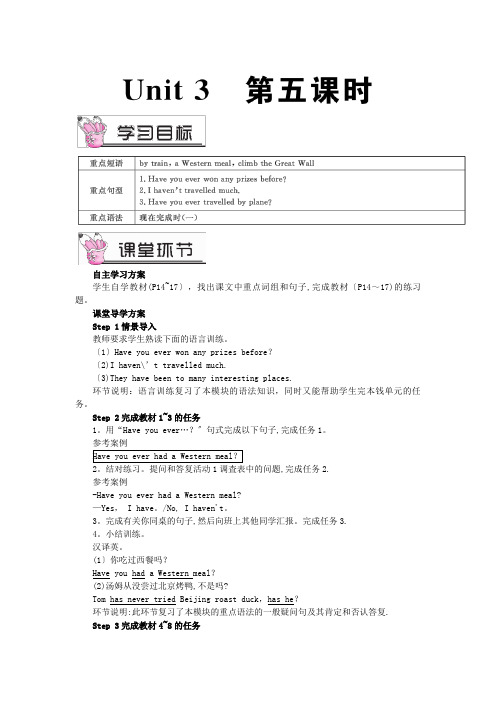
自主学习方案学生自学教材(P14~17〕,找出课文中重点词组和句子,完成教材〔P14~17)的练习题。
课堂导学方案Step 1情景导入教师要求学生熟读下面的语言训练。
〔1〕Have you ever won any prizes before?〔2)I haven\’t travelled much.〔3)They have been to many interesting places.环节说明:语言训练复习了本模块的语法知识,同时又能帮助学生完本钱单元的任务。
Step 2完成教材1~3的任务1。
用“Have you ever…?〞句式完成以下句子,完成任务1。
参考案例Have you ever had a Western meal?2。
结对练习。
提问和答复活动1调査表中的问题,完成任务2.参考案例-Have you ever had a Western meal?—Yes, I have。
/No, I haven't。
3。
完成有关你同桌的句子,然后向班上其他同学汇报。
完成任务3.4。
小结训练。
汉译英。
(1〕你吃过西餐吗?Have you had a Western meal?(2)汤姆从没尝过北京烤鸭,不是吗?Tom has never tried Beijing roast duck,has he?环节说明:此环节复习了本模块的重点语法的一般疑问句及其肯定和否认答复.Step 3完成教材4~8的任务1。
完成明信片.用在中国做的一系列事情来帮助你。
完成任务4,集体核对答案。
2。
用方框里的单词的适当形式填空。
完成任务5,集体核对答案。
3。
听录音完成表格。
在正确的答案上打“√〞.完成任务6,集体核对答案.4。
再听录音答复以下问题。
完成任务7,集体核对答案。
6.小结训练.句型转换。
(1〕My grandfather has lived here for fifty years。
〔就画线局部提问〕How long has your grandfather lived here?(2〕My brother has been to Italy four times。
人教版八年级英语上册教案Unit 2 第3课时

第三课时Section A(Grammar Focus-3c)重点单词maybe ad v.大概;或许;可能least ad v.最小;最少adj.&pron.最小的;最少的重点短语stay up late熬夜到很晚at least至少;不少于;起码重点句子1.I go to the movies maybe once a month.我大概一个月看一次电影。
2.He plays at least twice a week.他至少一周踢两次(足球)。
教学难点掌握有关做事的频率的问答观察下列句子的画线部分,并总结规律。
1.—What do you usually do on weekends?—I always exercise.2.—What do they do on weekends?—They often help with housework.3.—What does she do on weekends?—She sometimes goes shopping.4.—How_often do you go to the movies?—I go to the movies maybe once_a_month.5.—How_often does he watch TV?—He hardly_ever watches TV.6.—Do you go shopping?—No,I never go shopping.结论:①常见的频度副词有always、usually、often、sometimes、occasionally、seldom、rarely、hardly_ever、never(按频率大小排序)等。
②常见的表示频率的短语有once a week、twice a day、three times a month、every day等。
③对表频率的副词或短语提问用how_often(多久一次)。
人教版新目标八年级英语上册第2单元校本教材及作业
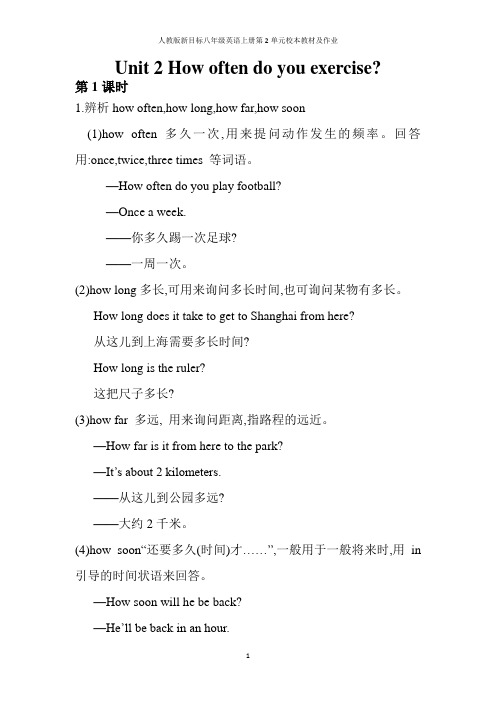
Unit 2 How often do you exercise?第1课时1.辨析how often,how long,how far,how soon(1)how often 多久一次,用来提问动作发生的频率。
回答用:once,twice,three times 等词语。
—How often do you play football?—Once a week.——你多久踢一次足球?——一周一次。
(2)how long多长,可用来询问多长时间,也可询问某物有多长。
How long does it take to get to Shanghai from here?从这儿到上海需要多长时间?How long is the ruler?这把尺子多长?(3)how far 多远, 用来询问距离,指路程的远近。
—How far is it from here to the park?—It’s about 2 kilometers.——从这儿到公园多远?——大约2千米。
(4)how soo n“还要多久(时间)才……”,一般用于一般将来时,用in 引导的时间状语来回答。
—How soon will he be back?—He’ll be back in an hour.——他多久回来?——他一个小时后回来。
2.hardly的用法hardly只用作副词,其意思是“几乎不”,表示否定概念。
He can hardly speak English,can he?他不太会说英语,是吗?hardly ever几乎从不Peter is hardly ever late.彼得几乎从不迟到。
hard也用作副词,意为“努力地;刻苦地;猛烈地” 。
He works hard only before exams.他只在考试前努力学习。
It’s raining hard(heavily).天在下大雨。
hard还可以作形容词,意为“难的,困难的”=difficult。
2020年春人教新目标英语八年级下册Unit2全单元教案(无答案)
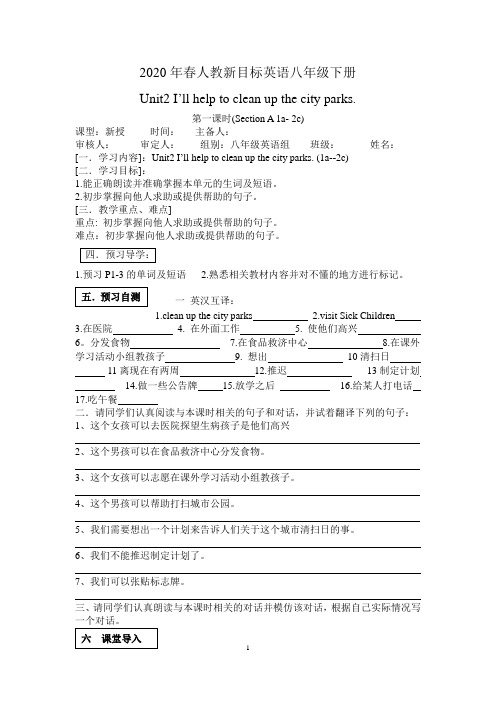
2020年春人教新目标英语八年级下册Unit2 I’ll help to clean up the city parks.第一课时(Section A 1a- 2c)课型:新授时间:主备人:审核人:审定人:组别:八年级英语组班级:姓名:[一.学习内容]:Unit2 I’ll help to clean up the city parks. (1a--2c)[二.学习目标]:1.能正确朗读并准确掌握本单元的生词及短语。
2.初步掌握向他人求助或提供帮助的句子。
[三.教学重点、难点]重点: 初步掌握向他人求助或提供帮助的句子。
难点:初步掌握向他人求助或提供帮助的句子。
1.预习P1-3的单词及短语2.熟悉相关教材内容并对不懂的地方进行标记。
一英汉互译:1.clean up the city parks2.visit Sick Children3.在医院4. 在外面工作5. 使他们高兴6。
分发食物7.在食品救济中心_____8.在课外学习活动小组教孩子9. 想出10清扫日______ 11离现在有两周_____12.推迟13制定计划__ ____ 14.做一些公告牌15.放学之后16.给某人打电话17.吃午餐二.请同学们认真阅读与本课时相关的句子和对话,并试着翻译下列的句子:1、这个女孩可以去医院探望生病孩子是他们高兴2、这个男孩可以在食品救济中心分发食物。
3、这个女孩可以志愿在课外学习活动小组教孩子。
4、这个男孩可以帮助打扫城市公园。
5、我们需要想出一个计划来告诉人们关于这个城市清扫日的事。
6、我们不能推迟制定计划了。
7、我们可以张贴标志牌。
三、请同学们认真朗读与本课时相关的对话并模仿该对话,根据自己实际情况写一个对话。
让学生小组回忆以前所学的有关于委婉(一)教学步骤1. 解读学习目标,学习新词汇2.教师通过玩游戏”Touch your ---”,然后引出询问向他人求助或提供帮助的句子:A: I like reading books.What could you do? B:You could volunteerin an after-school study program to teach kids. (选出写的好的小组进行加分)并核查预习案3.给学生5分钟的时间,让他们模仿1a中的短语进行相互问答练习并把他们编的对话写下来,听听力完成1 b,然后进行相互问答练习。
Unit 2 第3课时 Grammar:现在完成时(二)八年级英语下册(牛津译林版)

B.has been
C.was
D.went
2.I ________ to the West Lake four times, but I will go there again this summer.
A.have gone
B.have been C.went
D.had gone
3.Judy _______ the Sahara for a research on deserts and she will go to the Nile
has lived has lived has lived
since
here since he was born. here since 2007. here since many years ago.
主语
谓语
地点 状语
since
时间点
since在现在完成时中的用法有三种:1. since + 句子(一般过去时) 2. since + 时间 + ago 3. since + 过去的时间点(年/月/星期)
I (3) _b_o_r_r_o_w_e_d_ (borrow) a book about Hong Kong a week ago. It’s very useful. I (4) ___h_a_v_e_k_e_p_t_ (keep) it with me for a few days. It helps me learn more about Hong Kong.
2. 现在完成时sPinhcrea和sefsor的区别 3. 现在完成时短变延
Sentences Summary Practices
New Words
(新人教版)英语八年级上册 Unit 2 大单元教学设计
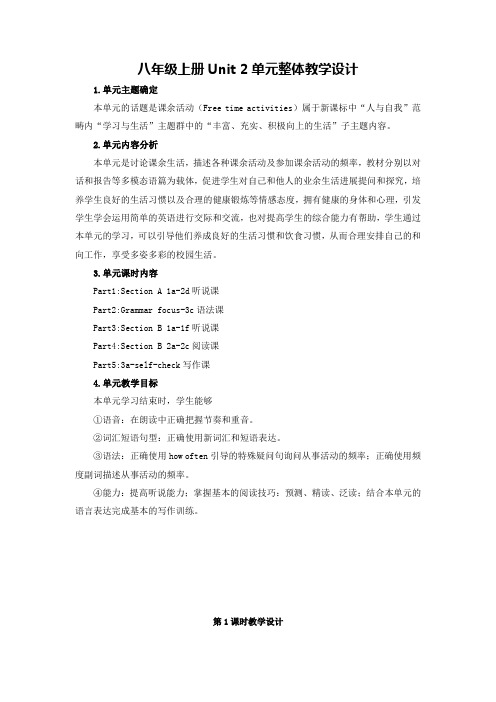
八年级上册Unit 2单元整体教学设计1.单元主题确定本单元的话题是课余活动(Free time activities)属于新课标中“人与自我”范畴内“学习与生活”主题群中的“丰富、充实、积极向上的生活”子主题内容。
2.单元内容分析本单元是讨论课余生活,描述各种课余活动及参加课余活动的频率,教材分别以对话和报告等多模态语篇为载体,促进学生对自己和他人的业余生活进展提问和探究,培养学生良好的生活习惯以及合理的健康锻炼等情感态度,拥有健康的身体和心理,引发学生学会运用简单的英语进行交际和交流,也对提高学生的综合能力有帮助,学生通过本单元的学习,可以引导他们养成良好的生活习惯和饮食习惯,从而合理安排自己的和向工作,享受多姿多彩的校园生活。
3.单元课时内容Part1:Section A 1a-2d听说课Part2:Grammar focus-3c语法课Part3:Section B 1a-1f听说课Part4:Section B 2a-2c阅读课Part5:3a-self-check写作课4.单元教学目标本单元学习结束时,学生能够①语音:在朗读中正确把握节奏和重音。
②词汇短语句型:正确使用新词汇和短语表达。
③语法:正确使用how often引导的特殊疑问句询问从事活动的频率;正确使用频度副词描述从事活动的频率。
④能力:提高听说能力;掌握基本的阅读技巧:预测、精读、泛读;结合本单元的语言表达完成基本的写作训练。
第1课时教学设计一、教学内容:Section A 1a-2d二、课型:听说课三、语篇研读What(主要内容):谈论课余简单的生活为主要话题,以对各类频度副词的学习和掌握,List(1a)看图列举周末活动;Listening(1b、2a、2b)主要是程涛正在讨论多久做这些活动,通过程涛的描述学习和理解频率的使用;Practice(1c、2c编对话关于周末有什么课余活动以及活动频率;Role-play(2d)Jack和Claire的对话,讨论下一周有哪些课余活动以及这些活动发生的频率,Claire丰富的课余生活。
【人教版】八年级英语上册 Unit 2 全单元英文教案

Unit 2 How often do you exercise?Language Goal 【语言目标】Talk about how often you do things:in this unit,students learn to talk about what things they do and how often they do these things.Knowledge Goals 【知识目标】Key Wordshousework,hardly,ever,once twice,full,maybe,least,junk,coffee,health,percent,online,although,through,mind,body,such,together,die,writer,dentist,magazine,however,than,almost,less,pointKey Phraseshow often,on weekends,go to the movies,hardlyever,twice a week,three times a week,be goodfor,at least,such as,less than,more than Key Sentences1. How often do you exercise?2.What do you usually do on weekends?Key Grammar1. The use of adverbs of frequency.2.“How often” cause of special questions andanswers.Ability Goals 【能力目标】1. Through the learning to gain the ability to talk about how often people do things.2.Write a report about how often people do things.Moral Goals 【情感目标】1. Keep a diary every day.2.Do more exercise and develop good habits to keep healthy.Teaching Time 【课时】Five periodsPeriod 1 Section A(1a-2d)Period 2 Section A(Grammar Focus-3c)Period 3 Section B(1a-1e)Period 4 Section B (2a-2e)Period 5 Section B (3a-Self Check)本单元的教学内容围绕“多久做一次运动”这一话题展开。
牛津译林版八年级英语上册Unit2第1-3课时练习(含答案)
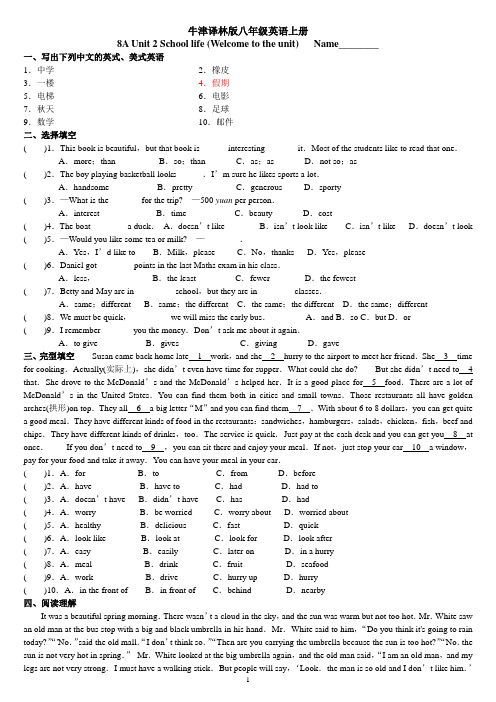
牛津译林版八年级英语上册8A Unit 2 School life (Welcome to the unit) Name________一、写出下列中文的英式、美式英语1.中学_______________ _____________ 2.橡皮____________ _____________3.一楼_______________ _____________ 4.假期____________ _____________5.电梯_______________ _____________ 6.电影____________ _____________7.秋天_______________ _____________ 8.足球____________ _____________9.数学_______________ _____________ 10.邮件___________ _____________二、选择填空( )1.This book is beautiful,but that book is______ interesting_______ it.Most of the students like to read that one.A.more;than B.so;than C.as;as D.not so;as( )2.The boy playing basketball looks______.I’m sure he likes sports a lot.A.handsome B.pretty C.generous D.sporty( )3.—What is the_______ for the trip? —500 yuan per person.A.interest B.time C.beauty D.cost( )4.The boat________ a duck.A.doesn’t like B.isn’t look like C.isn’t like D.doesn’t look ( )5.—Would you like some tea or milk? —________.A.Yes,I’d like to B.Milk,please C.No,thanks D.Yes,please( )6.Daniel got________ points in the last Maths exam in his class.A.less,B.the least C.fewer D.the fewest( )7.Betty and May are in_________ school,but they are in________ classes.A.same;different B.same;the different C.the same;the different D.the same;different( )8.We must be quick,_________we will miss the early bus.A.and B.so C.but D.or( )9.I remember_______ you the money.Don’t ask me about it again.A.to give B.gives C.giving D.gave三、完型填空Susan came back home late 1 work,and she 2 hurry to the airport to meet her friend.She 3 time for cooking.Actually(实际上),she didn’t even have time for supper.What could she do? But she didn’t need to 4 that.She drove to the McDonald’s and the McDonald’s helped her.It is a good place for 5 food.There are a lot of McDonald’s in the United States.You can find them both in cities and small towns.Those restaurants all have golden arches(拱形)on top.They all 6 a big letter“M”and you can find them 7 .With about 6 to 8 dollars,you can get quite a good meal.They have different kinds of food in the restaurants:sandwiches,hamburgers,salads,chicken,fish,beef and chips.They have different kinds of drinks,too.The service is quick.Just pay at the cash desk and you can get you 8 at once.If you don’t need to 9 ,you can sit there and enjoy your meal.If not,just stop your car 10 a window,pay for your food and take it away.You can have your meal in your car.( )1.A.for B.to C.from D.before( )2.A.have B.have to C.had D.had to( )3.A.doesn’t have B.didn’t have C.has D.had( )4.A.worry B.be worried C.worry about D.worried about( )5.A.healthy B.delicious C.fast D.quick( )6.A.look like B.look at C.look for D.look after( )7.A.easy B.easily C.later on D.in a hurry( )8.A.meal B.drink C.fruit D.seafood( )9.A.work B.drive C.hurry up D.hurry( )10.A.in the front of B.in front of C.behind D.nearby四、阅读理解It was a beautiful spring morning.There wasn’t a cloud in the sky,and the sun was warm but not too hot.Mr.White saw an old man at the bus stop with a big and black umbrella in his hand.Mr.White said to him,“Do you think it's going to rain today?”“'No.”said the old mall.“I don’t think so.”“Then are you carrying the umbrella because the sun is too hot?”“No.the sun is not very hot in spring.”Mr.White looked at the big umbrella again,and the old man said,“I am an old man,and my legs are not very strong.I must have a walking stick.But people will say,‘Look.the man is so old and I don’t like him.’When I carry an umbrella in fine weather people only say,‘Look at that stupid marl’.”( )1.The story happened__________.A.in a rainy day B.in the afternoon C.on a cloudy morning D.at a bus stop( )2.It was a very_______ day.A.hot B.bad C.fine D.cloudy( )3.There was________ in the old man’s hand.A.an umbrella B.a walking stick C.a bag D.a magazine ( )4.There was something wrong with the old man’s________.A.head B.arms C.legs D.feet( )5.Which is TRUE according to the story?A.The old man liked the weather.B.The old man thought that it was going to rain.C.The old man was too old to walk by himself.D.The old man wanted people to say he was stupid.8A Unit 2 School life (课时2)一、翻译词组1.英国学校的生活_______________ 2.一所混合型学校__________________3.喜欢看报纸和杂志_____________ 4.阅读周________________________5.上驾驶课_____________________ 6.花费更少的时间________________7.在每节课临近结束时___________ 8.开车送我去学校________________9.一个九年级的毕业生__________ 10.和新同学谈论学校生活_________11.在回家作业方面帮助我________ 12.愉快地相互交谈_______________二、根据中文写单词1.When I have birthday party,my best friend always gives me a________(特别的)present.2.What is your______________(最喜欢的)TV programmes?3.LiLei spent two hours__________(练习)speaking English yesterday.4.We call Grade 9 students________(毕业生).5.Do you often read___________(文章)written by LuXun?6.Tom dislikes__________(垒球)at all,he likes football best.7.we take part in after-school__________(活动)from Monday to Friday.8.YaoMing and LiuXiang are my____________(偶像).9.I can solve the problem by___________(我自己).10.Which cake is_________(美味),this one or that one?三、句形转换1.Lucy doesn’t run as fast as Lily.(同义句)Lily runs________ ________Lucy.2.What’s the weather like today?(同义句) ____________ ____________the weather today?3.School life in Britain/school life in the USA/different(连词成句)4.What does the word‘guy’mean?(同义句) __________ __________ __________ __________the word‘Guy’? 5.The trip was very boring at the beginning.(改为感叹句) _________ _________the trip was at the beginning!四、选择填空( )1.—Does he know how _________ these maths problem?—Maybe he does.A.to work out B.working out C.work out D.worked out( )2.The child felt happy ________he could stay at home with his parents.A.as B.because of C.because D.but( )3.Our teacher always helps_________our study and life.A.us to B.we with C.us for D.us with ( )4.I spend 20 dollars________this pair of sports shoes.A.buy B.bought C.to buy D.buying ( )5.The students always have a good time_______each other.A.talk with B.talking to C.to talk D.talking ( )6.I like the TV channel with funnier programmes but_______advertisements.A.few B.fewer C.1ittle D.1ess( )7.Children don’t always know________.A.what to do it B.how to do it C.what do D.how to do ( )8.Fishing is much better than_________TV.A.watching B.watch C.to watch D.watches ( )9.Last night Jim and I had a great time_________with each other.A.chating B.to chat C.chatting D.chatted( )10.How much did you_________that nice MP4? A.pay B.spend buying C.take buy D.cost to buy 五、阅读理解We each have a memory.That’s why We can still remember things after a long time.Some people have very goodmemories and they can easily learn many things by heart,but some people can only remember things when they say or do again and again.Many of the great men of the world have got surprising memories. A good memory is a great help in learning a language.Everybody learns his mother tongue(母语)when he is a small child.He hears the sounds,remembers them and then he learns to speak.Some children are living with their parents in foreign countries.They all learn two languages as easily as one because they hear,remember and speak two languages every day.In school it is not so easy to learn a foreign language because the pupils have so little time for it,and they are busy with other subjects,too.But your memory will become better and better when you do more and more exercises.( )1.Some people can easily learn many things by heart because_________.A.they always sleep very well B.they often eat good food C.they read a lot of books D.they have very good memories ( )2.Everybody learns his mother tongue________.A.at the age of six B.when he is a small child C.after he goes to school D.when he can read and write ( )3.Before a child can speak,he must_______.A.read and write B.make sentences C.hear and remember the sounds D.think hard( )4.In school the pupils can’t learn a foreign language well because________.A.they have no good memories B.they have no recordersC.they have too much tome for it D.they are busy with other subjects( )5.Your memory will become better and better_________.A.if you have plenty of good food B.if you do more and more exercisesC.if you do morning exercises every day D.if you get up early六、翻译句子1.Amy每天花一个半小时练习弹钢琴.2.你知道如何煮健康美味的食品吗?3.放学后,我们总是在一起愉快地相互交谈.4.在我来到这所学校之前,我不知道如何为我自己做些事情.5.英雄这个词的意思是某个你非常钦佩的人.6.在雨天,我爸爸总是开车送我去学校.8A Unit 2 School life (课时3)一、按要求写出相应的单词1.easy(反义词)__________________ 2.important(反义词)____________________3.interesting(反义词)_____________ 4.popular(反义词)______________________5.useful(反义词)_________________ 6.study(第三人称单数和现在分词)____/___7.good(比较级和最高级)______/____ 8.easy(比较级和最高级)________/_______二、用所给词的适当形式填空1.Tom has________(little)free time than Simon,but Mike has the_________(little).2.Like his friends,he likes________(watch)TV a lot.3.It’s________(use)to say‘sorry’again and again,try your best to do it better.4.Mr Li always practice_______(play)football after school.5.Yesterday Meimei picked the________(few)pears of the three.6.Jim writes to his best friend in England________(two)a month.7.Jim thinks English is___________(difficult)subject of all.8.The song is____________(popular)now,we seldom hear it.9.Mother always gets up__________(early)in my family.10.How__________(care)they are listening to the tape.三、选择填空( )1.You must speak English as_________ as possible.A.more B.most C.many D.much ( )2.He spent_______ time and planted_______ trees than any other student in our class,I felt very happy.A.most,more B.less,more C.less,less D.fewer,less( )3._________you speak English,_________your spoken English can be.A.The more,better B.More,the better C.More,better D.The more,the better( )4.Yesterday was bad,but today is even_________.A.badly B.bad C.worse D.the worst ( )5.Tom made___________ mistakes than Simon in the English test,But he made mistakes than Lucy.Simon made_________ mistakes of the three.A.more,fewer,fewest B.less,fewer,least C.less,fewer,the fewest D.more,fewer,the fewest ( )6.—I’ve had enough bread.Would you like__________? —,No,thanks.A.a few more B.one more C.another more D.some more( )7.Bob skates_______ than I,But he doesn’t skate________ my brother.A.better:so good as B.better;so well as C.better;as good as D.much well;as well as( )8.Light travels________ than sound.A.much fast B.far fast C.much faster D.more taster ( )9.Please hurry up,________you will be late for school.A.and B.but C.or D.so( )10.There are many_______ between two pictures.A.difference B.differences C.difficult D.difficults ( )11.Listen carefully! I have________ to tell you.A.something important B.nothing important C.important nothing D.important something( )12._________fine weather it is today! A.How B.How a C.mat D.What a ( )13.Be careful! Try to make as________ mistakes as you can.A.many B.much C.little D.few( )14.If you want to be________,you have to eat_______ food and take_______ exercise.A.thin:little;many B.thin;little;more C.thinner;less;more D.thin;less;much( )15.The news is really_________,and everyone is_______.A.exciting;exciting B.exciting;excited C.excited;exciting D.excited;excited四、阅读理解Mrs.Green was eighty,but she had a small car,and she always drove to the shops on Saturday and bought her food.She didn’t drive fast because she was old,but she drove well and never hit(撞)anything.Sometimes her grandchildren said to her,“Please don’t drive your car,grandmother.We can take you to the shops.”But she always said,“No,I like driving.I've been driving it for fifty years,and I'm not going to stop driving.”Last Saturday she stopped her car at some traffic lights because they were red and then it did not start again.The lights were green,then yellow,then red,。
最新仁爱英语八年级上册第二单元Unit-2-Topic-3-SectionA-B课文知识点讲解

八年级上册第二单元Topic 3 SectionA-B一、重点句型及知识点讲解1. May I ask you some questions, Dr. Li ? ---- Sure, go ahead. 我能问你一些问题吗,李医生?当然,请问吧。
(1) 1)疑问句和否定句中,表“一些”,常用any, 不用some. 但当此疑问句表建议或请求时,Some不改成any. 如:Would you like some tea ?2)question意为“问题,疑问”,指较易解决的问题及口头回答的问题。
如:Can you answer the question?你能回答这个问题吗?【辨析】problem和question都当“问题”讲,但它们是有区别的。
Problem 通常指难以解决的问题,尤指比较困难的问题,如社会、政治和经济等。
与它搭配的动词一般是work out或solve;而question常指对某事疑惑不解需要寻找答案的问题,它常与动词ask或answer搭配使用。
如:We must solve the problem of heavy traffic in Beijing as soon as possible.我们必须尽快解决北京的交通拥挤问题。
This is a difficult question to answer.这个问题很难回答。
(2) Sure , go ahead 当然可以,请问吧!Go ahead.(口语)表示同意对方的请求,根据情况可译为“说吧”!“做吧”! 如:__Can I read the sports section ? 我可以看看体育版吗?__Yeah, go ahead.请看吧!【拓展]】(1)go ahead and do sth .赶紧做某事。
如:Go ahead and eat before everything gets cold.趁东西还没凉赶紧吃。
(2)go ahead of 在……之前去。
2020年八年级英语下册 Module 8 Time off Unit 2&3课时训练 (新版)外研版
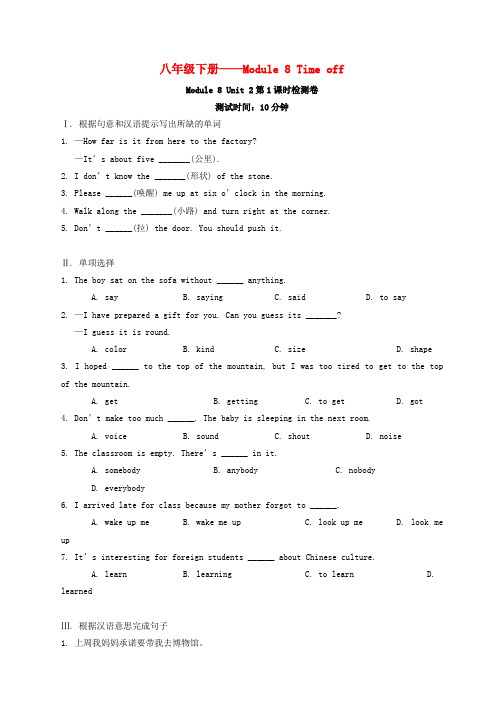
八年级下册——Module 8 Time offModule 8 Unit 2第1课时检测卷测试时间:10分钟Ⅰ. 根据句意和汉语提示写出所缺的单词1. —How far is it from here to the factory?—It’s about five _______(公里).2. I don’t know the _______(形状) of the stone.3. Please ______(唤醒) me up at six o’clock in the morning.4. Walk along the _______(小路) and turn right at the corner.5. Don’t ______(拉) the door. You should push it.Ⅱ. 单项选择1. The boy sat on the sofa without ______ anything.A. sayB. sayingC. saidD. to say2. —I have prepared a gift for you. Can you guess its _______?—I guess it is round.A. colorB. kindC. sizeD. shape3. I hoped ______ to the top of the mountain, but I was too tired to get to the top of the mountain.A. getB. gettingC. to getD. got4. Don’t make too much ______. The baby is sleeping in the next room.A. voiceB. soundC. shoutD. noise5. The classroom is empty. There’s ______ in it.A. somebodyB. anybodyC. nobodyD. everybody6. I arrived late for class because my mother forgot to ______.A. wake up meB. wake me upC. look up meD. look me up7. It’s interesting for foreign students ______ about Chinese culture.A. learnB. learningC. to learnD. learnedⅢ. 根据汉语意思完成句子1. 上周我妈妈承诺要带我去博物馆。
人教版小学英语八年级上册Unit2Section B(3a-Self Check)教学教案及教学反思
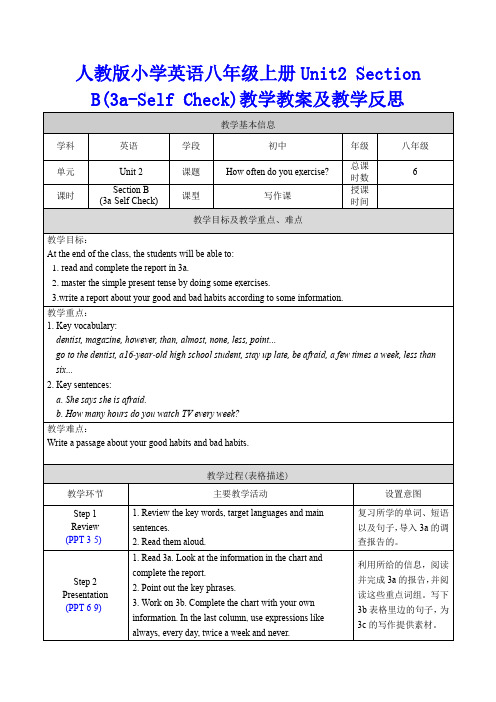
教学基本信息
学科 单元 课时
英语
Unit 2 Section B (3a-Self Check)
学段
初中
课题
How often do you exercise?
课型ห้องสมุดไป่ตู้
写作课
教学目标及教学重点、难点
年级
Practice the language points and the grammar of Unit 2.
How healthy are you? Write about your own habits.
完成第 1、2、3 题,熟 练运用频率副词。
通过单选、连词成句、 选词填空、选词填空和 汉译英等形式练习所 学的知识点。 今天的作业是写一篇 自己习惯的文章,练习 3a 和 3c 的作文形式。
Step 6 Self Check (PPT 20-22)
Step 7 Exercises (PPT 23-33)
Step 8 Homework (PPT 34)
1. Write some sentences about the good habits and and bad habits in 3b. 2.Work on 3c. Write a report about your good and bad habits. Say how often you do things. Use the report in 3a as an example. 3.Show one of the good passages to other students. 4.Analyzes the good sentences and correct the errors in report. 1.Take the health quiz. Compare your results with your partner’s. Who’s healthier? 2. Compare healthy life with unhealthy life. 1. Explain the usage of however and more than. 2. Read the Language points.
八年级上册英语第二单元grammar focus

八年级上册英语第二单元grammar focus一、课程内容1. 课程名称:八年级上册英语第二单元grammar focus2. 课程主要内容:本单元主要讲解英语语法中的一些重点内容,包括时态、语态、句型转换、从句等方面的知识。
3. 课程目的:通过学习本单元的内容,学生将能够正确运用所学的语法知识,提高英语写作和口语表达的能力。
二、课程大纲1. 时态:本单元将重点讲解一般现在时、一般过去时、一般将来时、现在进行时、过去进行时等时态的构成和用法。
2. 语态:本单元将介绍主动语态和被动语态的区别,以及它们在句子中的应用。
3. 句型转换:学生将学习如何对一些常见的句型进行转换,如祈使句、感叹句、条件句等。
4. 从句:本单元将讲解定语从句和状语从句的构成和用法,帮助学生理解和运用从句在句子中的作用。
三、教学安排1. 第一课时:时态的基本概念及一般现在时的用法2. 第二课时:一般过去时和一般将来时的构成和用法3. 第三课时:现在进行时和过去进行时的区别及用法4. 第四课时:主动语态和被动语态的区别及用法5. 第五课时:句型转换的综合应用6. 第六课时:定语从句和状语从句的构成及用法四、教学方法1. 讲授法:通过老师的讲解,向学生介绍和解释语法知识的内容。
2. 练习法:通过大量的练习,巩固学生对语法知识的理解和掌握。
3. 对话法:通过对话的形式,让学生在实际交流中应用所学的语法知识。
五、教学要求1. 知识准确:学生要求掌握本单元所学的时态、语态、句型转换和从句的基本知识。
2. 应用灵活:学生要求能够在写作和口语表达中,灵活运用所学的语法知识。
3. 提高能力:通过学习本单元的内容,学生将能够提高自己的写作和口语表达能力,使表达更加准确和流畅。
六、总结通过本文的介绍,我们了解了八年级上册英语第二单元grammar focus的主要内容和教学安排。
通过学习本单元的内容,学生将能够提高自己的英语语法水平,同时也为以后的英语学习打下坚实的基础。
八年级下册英语u2第3课时(A Grammar Focus-4c)课件

fix up 修理;装饰
②“动词+介词”型 相当于及物动词,其后必须有宾语,且宾语总是位于 介词之后。此类介词有for, after, about, of, from, to, with, at 等。
care for 照顾;非常喜欢 laugh at 嘲笑 agree with 同意
wait for 等待 look after 照顾;照料 look for 寻找;寻求
D. put off
作宾语
主语+谓语+ to do
常接动词不定式作宾语的动词有want/plan/agree/learn/ hope/refuse/decide to do 等。
另一种是“疑问词+动词不定式”结构作动词或介词的 宾语。 例:他教我如何使用手机。
He taught me how to use mobile phone.
She raised her voice to be heard better. 目的状语
I’m sorry to trouble you.
原因状语
She is too young to go to school.
动词短语
1 定义 动词加介词、副词或其他词构成的短语称 为动词短语,其作用和动词差不多,有的 相当于及物动词,有的相当于不及物动词。
I’d like to help homeless people.
She decided to try out for a volunteer after-school reading program.
You could ask hospitals to let you visit the kids and cheer them up.
八年级英语下册第二单元课件(全单元)
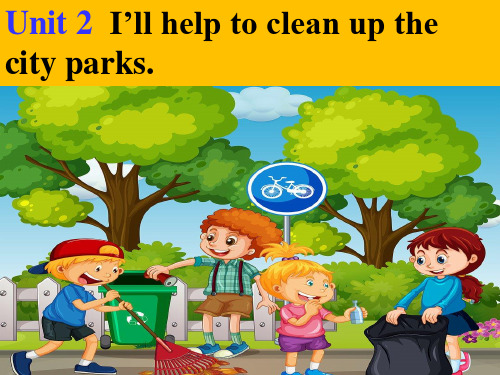
预习成果检测:
帮助摆脱饥饿 help stop hunger 使振奋起来 cheer up 分发 give out 食物库 food bank 教孩子 teach kids 课外学习项目 after-school study program
Let’s be volunteers!
What volunteer jobs do you know?
A group of students are planning a City Park
2a Clean-Up Day. Listen and check (√)the things they
are going to do to tell people about it.
√
√
√
2b Listen again. Fill in the blanks.
3.What can we do to help the old people? We can read newspaper to them, or just talk to them.
4. Do you think we have to care for the olds? Why or why not?
1. We need to___c_o_m__e _u__p__w_i_th_____ a plan to tell people
about the city park clean-up.
2.Clean-Up Day is only two weeks from now. We can’t
____p_u_t_ __o_f_f___ making a plan. 3.We could ____p_u_t_ _u__p____ signs.
Module+3+Unit+2+课时教案 外研版英语八年级上册
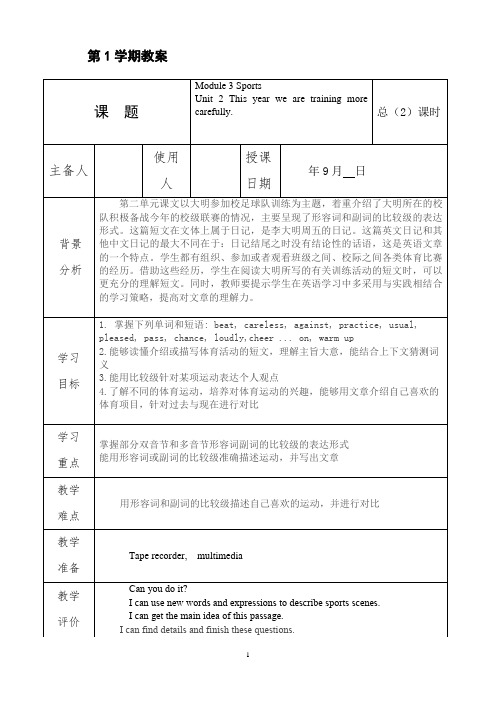
第1学期教案课题Module 3 SportsUnit 2 This year we are training morecarefully. 总(2)课时主备人使用人授课日期年9月日背景分析第二单元课文以大明参加校足球队训练为主题,着重介绍了大明所在的校队积极备战今年的校级联赛的情况,主要呈现了形容词和副词的比较级的表达形式。
这篇短文在文体上属于日记,是李大明周五的日记。
这篇英文日记和其他中文日记的最大不同在于:日记结尾之时没有结论性的话语,这是英语文章的一个特点。
学生都有组织、参加或者观看班级之间、校际之间各类体育比赛的经历。
借助这些经历,学生在阅读大明所写的有关训练活动的短文时,可以更充分的理解短文。
同时,教师要提示学生在英语学习中多采用与实践相结合的学习策略,提高对文章的理解力。
学习目标1. 掌握下列单词和短语: beat, careless, against, practice, usual, pleased, pass, chance, loudly,cheer ... on, warm up2.能够读懂介绍或描写体育活动的短文,理解主旨大意,能结合上下文猜测词义3.能用比较级针对某项运动表达个人观点4.了解不同的体育运动,培养对体育运动的兴趣,能够用文章介绍自己喜欢的体育项目,针对过去与现在进行对比学习重点掌握部分双音节和多音节形容词副词的比较级的表达形式能用形容词或副词的比较级准确描述运动,并写出文章教学难点用形容词和副词的比较级描述自己喜欢的运动,并进行对比教学准备Tape recorder, multimedia教学评价Can you do it?I can use new words and expressions to describe sports scenes.I can get the main idea of this passage.I can find details and finish these questions.I can find all the cause and effect relationships in this passage.I can write a passage to describe the differences with given information.教与学活动过程个性修改Step 1 Lead -in.1. Work in pairs and talk about the pictures.2.Read the words and expressions in the box.3.Let students translate these words and expressions. And students knowthis lesson is about football match according to the pictures.Step 2. Pre-reading:1.Question: What can you see in the pictures? (Use the words andexpressions in the box)Answer: The fan club _____ the players ___ loudly.The blue team ______ the red team.The blue team _____ _____ the red team.Keys:cheered on; beat; played against2.From the pictures, we know there are several elements to a match.Step 3. While-reading1.Read and match the main idea of each paragraph.Para. 1 ①Daming’s team hopes to have more fans.Para. 2 ②The coach is pleased with them and their team has abetter chance of winning.Para. 3 ③Daming is going to school for football practice.Para. 4 ④It is more difficult to practise in winter.Keys: Para. 1 --③Para.2---④Para. 3----②Para. 4---①Question: What’s the meaning of “pleased”? Does it mean “angry” or“happy”?2.Read again and share your answers.(1).When will Daming’s team play against the other school?(2). What is important to do when it gets dark earlier?(3).Why is their coach pleased?(4).Why do they hope to play well?Check answers and find the sentences in the passage.3.Read carefully and fill in the blanks.Try to find answers and find all the cause and effect relationships in the passage.Step 4. Post-reading1.Fill in the blanks of this mind and then retell the text.Keys: Saturday; as early as; harder; after-school; more; better chance; more fans; more confidentAnd then try to retell this passage.Eg: Daming’s team is training hard. They play football on Saturday and arrive as early as they can. .......Select several students to retell this passage with this mind.plete the passage with the words in the box.We all know (1) __________ makes perfect. But it is more difficult topractise in winter because the days are (2) _________ and it is cold. The team is training harder than (3) _________. Their (4) _________ is pleased with them. They are going to play (5) _________ a team from another school next week, and they have a good (6) ___________ of winning.Keys: practice; short; usual; coach; against; chance3.Free talk (work in pairs):If Daming’s team wins this year, what do you think the reason is? And what can we learn from Daming and his football team?Reasons : They trained hard and more carefully. ……Nothing is impossible to a willing heart. 有志者事竟成Step 5. Writing1.Discussion: If Chinese football team wants to do better in thefuture, what should they do?Work in groups and write down your ideas.Then imagine that you will interview a member of your school football team by using the following sentences and make a report. Make a comparison between last year and this year. And give them some advice.2.Put the words in the box into pairs with opposite meaningsbadly carefully carelessly difficult early easy late quickly slowly wellKeys: badly--well carefully--carelessly difficult--easy early--late quickly--slowlyAll these words are adverbs. Make students find the sentences with adverbs in the passage.Summarize the characteristics of adverbs and differences between adjectives and adverbs. Then finish Activity 3 on page 23.1. They are working ____ (hard) to learn English.2. This bike was ___(cheap), so we decided to buy it.3. The teacher speaks ________ (slow) and __________(careful).4. Mary is going to get up _______ (early) because she needs to catch the first bus.5. Running is very________ (easy).You can do it anywhere.6. I do not like to be _______ (late).7. I am afraid our team is doing very _________ (bad).Keys: hard; cheap; slowly; carefully; early; easy; late; badlyStep 6. Language Points1.I am not going for lessons, but to play football.“not... but...”的意思是:“不是...而是...” 通常用于表达两件事物之间的相反或矛盾的关系,用于强调一种对比。
- 1、下载文档前请自行甄别文档内容的完整性,平台不提供额外的编辑、内容补充、找答案等附加服务。
- 2、"仅部分预览"的文档,不可在线预览部分如存在完整性等问题,可反馈申请退款(可完整预览的文档不适用该条件!)。
- 3、如文档侵犯您的权益,请联系客服反馈,我们会尽快为您处理(人工客服工作时间:9:00-18:30)。
课题Unit2 I’ll help to clean up the city parks.
Grammar Focus —1e
课型听说课
教学目的要求知识目标:1.会背单词表12-13页单词raise, alone, repair, fix up, give, away ,take after ,broken,wheel
2.会背12-13页短语。
能力目标: 听懂“帮助他人,参加社会公益”的相关话题及文章;掌握向别人求助或提供帮助的句式。
情感目标: 学会关注他人、社会、利用自己的特长为他人、社会做贡献,投身于社会公益活动,增强社会责任感。
教学
重难
点
掌握单词、重要短语和句子在语言环境中的应用。
教学
方法
六步导学法
教学
准备
磁带播放器
教学过程I. Pre-class
1. 翻译下列短语
张贴___ ____ 分发___ ____ 推迟___ ___________ 使某人兴奋起来___ __________ 打电话给某人___ __________________
修理坏自行车___ ______________ 捐钱给无家可归的孩子___ ___________ 提出想出___ ________________ 给某人捐赠某物__ _________________ 2. 知识超市:
词汇: 1)alone 独自;单独adv. He likes to work alone.
adj. She is alone at home.
lonely 孤独的,无伴的;荒凉的adj. 指心理的孤独和寂寞。
I was alone but I didn’t feel lonely.
a lonely village 一个荒凉的村子
2)mend , repair和fix 区别
mend“修补;修”,其含义更强调“补”。
如:There is a hole in my shirt. I asked my mom to mend it for me.
repair“修理”,主要指机械性修理。
如:Who can repair the broken desks?
fix“安装;修理”,强调安装、固定之意。
如:They are fixing a new bike for us.
教学过程4) Mary doesn’t take _________ her mother in any ways.
5)He always ________ out of his money before the end of the month...
6)Li Ming wrote the notice and I p____ it up.
7)My parents often _______ away some clothes to charity.
II.While-class
1. Leading-in
Ask: What kind of volunteer work did you do? When did you do? Who did you do with?
Do you know what kind of volunteer work Jimmy did? Now let us look at Section B.
2. Learning the new knowledge
(1)根据音标拼读单词,然后两人一组检查拼读情况。
(2)教师纠正发音不准的词并检查单词预习情况。
(3)课前提问:Grammar Focus,4a,4b和4c.
(4)自主朗读1a并完成1a。
(5)组内完成1b,然后挑选最佳语句班内展示。
(6)听力: 听录音排序完成1c。
听录音判断正误完成2a.。
(7)根据听力1c 和1d 内容完
板书设计Unit2 I’ll help to clean up the city parks.
Grammar Focus —1e
give away…to …给某人捐赠某物
volunteer …to do sth.志愿牺牲…去做某事
stop doing sth./ to do sth.停止正在做的事去做另一件事
What do you do?
I fix up …
作业与同伴联系对话;背诵该页单词及短语反思。
